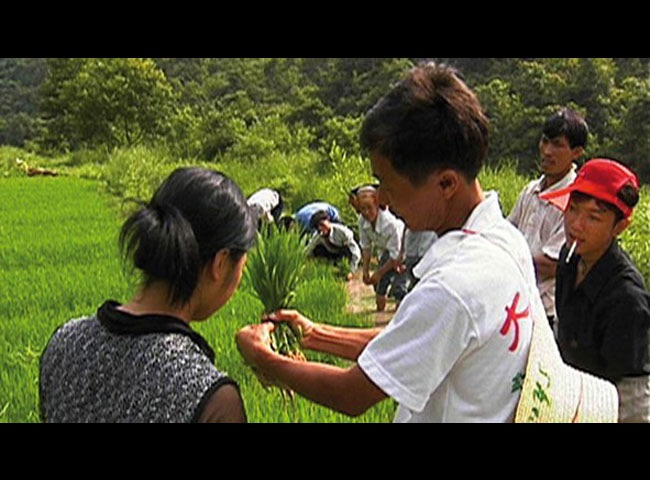La Dernière Migration
-
Réalisé par Lingping Huang, Yan Zhong • Écrit par Lingping Huang, Yan Zhong
-
France • 2008 • 52 minutes • DV Cam • Couleur
- Réalisation :
Lingping Huang, Yan Zhong - Écriture :
Lingping Huang, Yan Zhong - Image :
Lingping Huang, Yun Li, Ying Wang - Son :
Yan Zhong - Montage :
Lingping Huang, Axelle Schatz, Yan Zhong
- Production (structure) :
ICTV - Diffuseur :
Guangxi Télévision - Ayant droit :
ICTV
- N° ISAN :
ISAN 0000-0002-0E6F-0000-T-0000-0000-O
Résumé
Les derniers semi-nomades chinois vivent dans la Province de Guangxi, au sud-ouest de la Chine. Toutes les deux ou trois générations, ils effectuent une migration de plusieurs centaines de kilomètres. La tribu des Guoshans, que nous allons suivre dans ce film, fait partie de l’ethnie des Yaos. Elle se compose de vingt-trois familles qui, à la fin des années 90, vivaient encore de la chasse et de la cueillette. Bien que ne possédant pas de terres, cette tribu avait pour habitude de vivre en autarcie dans les hauteurs des montagnes reculées de cette province.
C’est au printemps 2000 que les élus locaux ont décidé d’inciter cette tribu à s’installer définitivement au pied de la montagne, sur un terrain que le gouvernement avait acheté pour leur construire un nouveau village. Zuao Wenming, leur leader, accompagné de trente autres membres de la tribu, est venu en éclaireur : il s’agit d’apprendre à planter et à cultiver le riz. Alors qu’ils sont habitués à vivre et à travailler de manière individuelle, pour cette ultime migration qui doit faire d’eux des paysans sédentaires, ces hommes et ces femmes décident de former une coopérative, un collectif économique, partageant travail et revenus.
C’est un mode de production que les paysans chinois ont abandonné pendant les réformes des années 80 mais en l’occurrence, pour réaliser cette dernière "migration", les membres de la tribu se sont inspirés de cette méthode. Leurs premières expériences du travail collectif engendrent des conflits significatifs au sein de la communauté, au point que l’on se demande combien de temps les membres de la tribu vont continuer à opérer sur ce modèle avant de reprendre leur existence passée, basée sur le travail individuel.
Chinas last semi-nomades live in the South-Western province of Guangxi : they are part of the Yao ethnical group who, following a thousand year old tradition, select a new temporary home every two or three generations, usually distancing themselves from their previous temp-home by severall hundreds of kilometers. In this film, we follow the twenty-three families strong Guoshan tribe, a sub-group of Yaos, who during the late 1990's still lived off hunting animals and collecting fruits and roots. Not owning any land, this tribe managed to survive, if scarcely, in remote mountain areas of this province without the help of anybody.
It was in the early days of the year 2000 when the leaders of the village down in the valley decided to help the tribe, and purchased a substantial piece of land for them to build their own permanent village, as well as to grow rice and vegetables to enable them to sustain their living. Zhao Wenming, the tribe's leader as well as thirty members decide to precede the whole tribe's move : the aim is to build the houses of the new village and to learn cultivating rice so as to allow them to become independent from public support. Although they had a strong sens of community they had been used to operate individually when it came to survival. In this instance, as they learn to become farmers, it has been decided between them to operate under a collective scheme, just as in the early days of China's communist revolution.
This way of operating had been long abonndend by the majority of China?s farmers since the reforms of the 1980?s. Yet, in this case, it was felt this was the most appropriate method of sharing both work and revenue. However, for our tribe, this first experience of collective work creates a number of conflicts among the group, to the point that people start asking themselves for how long this can continue before the tribe breaks up, and they go back to individual forms of work.
Collection
Mot(s)-clé(s) thématique(s)
Comment avoir accès au film ?
-
Édition DVD
- Il n'existe pas d'édition DVD à notre connaissance
-
Accès VOD
- Il n'existe pas d'accès en VOD à notre connaissance
- Diffusion non commerciale / Consultation


